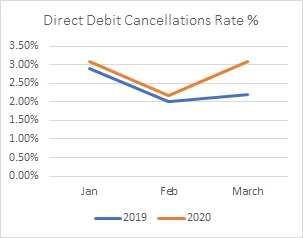Direct debit cancellations jump under Covid-19
The Covid-19 pandemic has seen a jump in cancellations of Direct Debit charity donations, according to data from Rapidata.
Rapidata’s tracking data for charitable regular giving reveals that over the past month, UK charities have seen a large increase in cancellations of regular Direct Debit donations, rising from 2.16% in February to 3.09% in March.

The charity Direct Debit cancellations rate for March 2020 is the biggest swing from February to March ever recorded. However, it remains significantly lower than the highest ever rate for the same month, recorded during the 2008/9 recession at 4.33%.
The majority of Direct Debit donations were cancelled in the last two weeks of the month, correlating with the introduction of social distancing and subsequent UK lockdown.
Additionally, the number of new donors for the month of March was almost a quarter lower (24.11%) than the same month last year, accelerating during the last two weeks of the month at 58.17% lower than the same period in 2019.
Daniel Fluskey, the Institute of Fundraising’s Head of Policy & External Affairs, said:
“The rise in cancellations shows just how challenging the coronavirus crisis is for charities’ incomes. Many of the most committed and generous supporters are having to cancel donations and the limits on social contact mean that charities are unable to deliver much of their fundraising activities. As a result, frontline charitable services are heavily at risk both now and in the future, which is why we urgently need a package of support from the Government.
“According to the Coronavirus Impact Survey, on average, charities are predicting a 48% fall in voluntary income, recognising that supporters are fearful for their own financial situations. While it’s an incredibly challenging environment for fundraising, we are seeing some remarkable acts of generosity and responses to emergency appeals – showing that people can and will still give, though perhaps in different ways and levels than in recent years.”
Scott Gray, Rapidata lead and Head of Payments for The Access Group, which Rapidata is a part of, commented:
Advertisement
“We have recorded a shift away from the annual cancellation cycle that we would only expect in the wake of an extenuating event. Clearly the coronavirus pandemic has had a major impact on regular giving to charities. Social distancing and lockdown in the UK have resulted in job losses and furlough arrangements with many individuals concerned about the security of their future income. Naturally people will be considering financial priorities and their ability to continue supporting their chosen charities.”
“The rate for March is lower than levels experienced at the height of the recession in 2008/9. It remains to be seen whether the lockdown measures brought in during March resulted in an incidental spike as the majority of supporters immediately affected chose to cancel their donations during those few weeks, or whether cancellations will continue to build as so does the pandemic.”
“Almost three quarters of charities fear going bust without financial support; the real worry for the public is of course the end of the vital services and assistance those charities provide. Anecdotally we’re hearing of positive results being reported across digital and telephone fundraising, but with most charities expecting more losses the reality may mean a higher rate still for April.”



